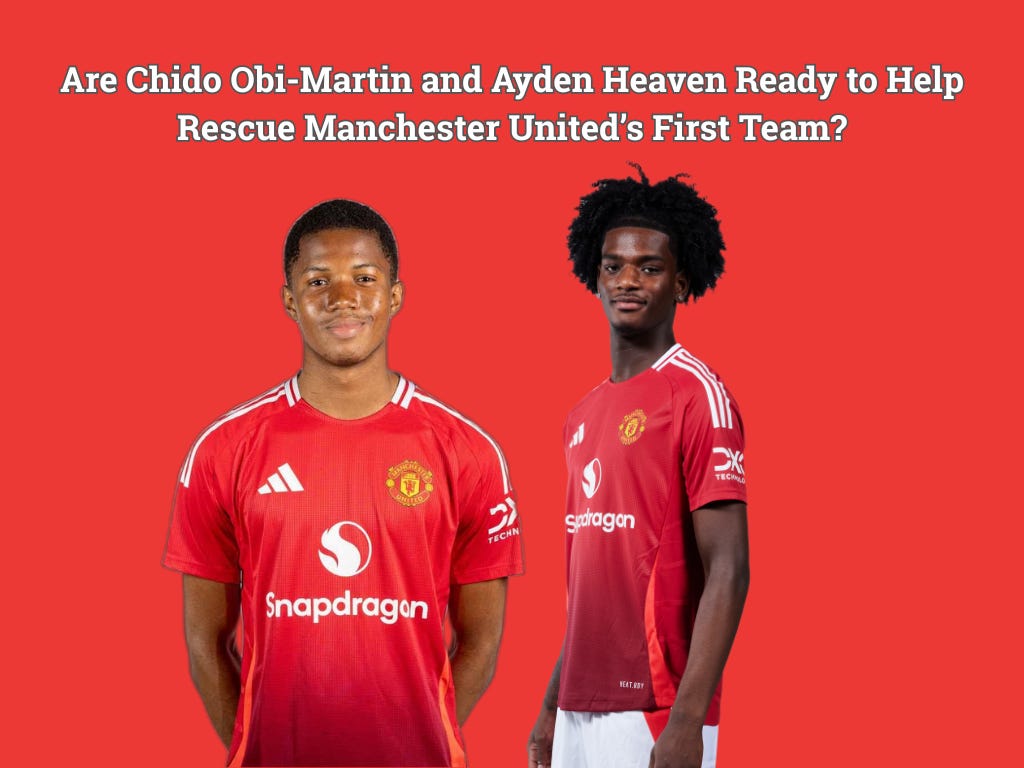Are Chido Obi-Martin and Ayden Heaven Ready to Help Rescue Manchester United’s First Team?
Manchester United is a club steeped in history, a towering institution where the weight of expectation is as heavy as the trophy cabinet is decorated. For young players stepping into the first team, the spotlight burns brighter, the scrutiny sharper, and the pressure unrelenting. The fanbase, passionate, vocal, and global, demands success, a legacy forged by decades of dominance and a culture of winning that stretches back generations. It’s a daunting stage, especially for teenagers like Chido Obi-Martin and Ayden Heaven, two prodigies plucked from Arsenal’s youth ranks who now stand on the cusp of United’s senior squad. The question looms: Are they ready to shoulder the burden and help lift the club from its current position?
Playing for Manchester United at a young age isn’t just about talent—it’s about resilience. The Theatre of Dreams has a way of amplifying both triumph and failure. Every misplaced pass, every missed chance is dissected by millions, from the Stretford End to social media. The club’s legendary culture of winning, built on the backs of icons like Sir Matt Busby’s Babes and Sir Alex Ferguson’s dynasties, sets an impossibly high bar. For teenagers, it’s a crucible that can either forge greatness or break spirits. And yet, history shows it’s a stage where the bravest and best have thrived.
Enter the Class of ’92—Ryan Giggs, Paul Scholes, David Beckham, and Gary Neville among them—a group of homegrown talents who didn’t just survive the pressure but transformed Manchester United into a world-class juggernaut. Emerging from the FA Youth Cup triumph of 1992, these young stars became the heartbeat of Ferguson’s treble-winning side in 1999, a team that conquered the Premier League, FA Cup, and Champions League in one glorious season. Giggs, with his dazzling wing play, debuted at 17 and went on to become United’s most decorated player. Scholes, a midfield maestro, broke through at 19, his vision and tenacity redefining the game. Beckham, the global icon, was 20 when he cemented his place, his set-piece mastery and work rate silenced doubters. Neville, the gritty right-back, was 20 too, his leadership emerging early as he captained the youth side to glory. Together, they defied Alan Hansen’s infamous quip—“You can’t win anything with kids”—and turned United into a dynasty.
That golden generation faced pressure, but they also had Ferguson’s genius and a squad of seasoned winners to lean on. Today’s Manchester United is a stark contrast. This is arguably the worst side in the club’s Premier League history, languishing in mid-table mediocrity as of March 2025, with a squad plagued by inconsistency and a fanbase growing restless. The glory days feel distant, and the need for a spark—any spark—is desperate. Manager Rúben Amorim has acknowledged the potential in Obi-Martin and Heaven, recently stating,
“Ayden Heaven and Chido Obi both have to improve a lot… but they’re ready to play for Man United. They have to be prepared. It is our tradition to put young players in the first team.”
His words echo United’s storied past, but the stakes now are higher than ever.
Chido Obi-Martin, a 17-year-old Danish striker, is a goal-scoring phenomenon whose prolific form in Arsenal’s youth setup, where he once netted 10 goals in a single match, caught United’s eye. His pace, finishing, and Rashford-esque flair have fans dreaming of a new talisman. Ayden Heaven, an 18-year-old English centre-back, brings composure and physicality, traits desperately needed in a backline that’s often looked fragile. Both arrived in late 2024, part of a raid on Arsenal’s academy.
Now I know what you may be thinking, what about the other youngsters in the squad like Leny Yoro, Kobbie Mainoo, Alejandro Garnacho, and Amad Diallo? They are already making their mark on the first team, but Yoro is the only one currently without a knock, so their impact has been minimal at best for the majority of the season. So, the two new young additions have to be ready for everything that will be thrown their way.
Readiness for Obi-Martin and Heaven isn’t just about skill, it’s about mentality. The Class of ’92 thrived because they had each other, a tight-knit group forged in the crucible of United’s youth system, guided by the fiery Scotsman, Ferguson. Obi-Martin and Heaven, for all their promise, step into a fractured squad lacking cohesion and leadership. The pressure to perform isn’t just about personal growth; it’s about salvaging a season, a club, a legacy. At 17 and 18, they’re being asked to do what even seasoned pros have struggled with in this United side for what seems like every season since Mourinho, turn the tide.
Talking about the Class of ’92 is tempting, but Giggs and company emerged during a transitional phase, yes, but United were still a force. They still had several of the players that were crucial to their European Cup win two years earlier. Today’s United needs Obi-Martin and Heaven to be more than prospects—they need them to be practically saviors. A striker who can score in clutch moments and a defender who can steady a shaky backline could propel United back toward relevance. The fans, starved for heroes, are ready to anoint them, but that love comes with expectation.
History says it’s possible. Giggs, Scholes, Beckham, and Neville all cemented themselves in the main team at a very young age and proved to be crucial players in the history of the club. Amorim’s faith in them is encouraging, and United’s tradition of blooding youngsters offers hope. Yet, in this difficult chapter of Manchester United’s story, their readiness will be tested not just by their skills, but by their ability to carry a tremendous amount of weight on their young shoulders. If they can, they might just write their own legendary chapter—and pull United back toward the top where they belong.




